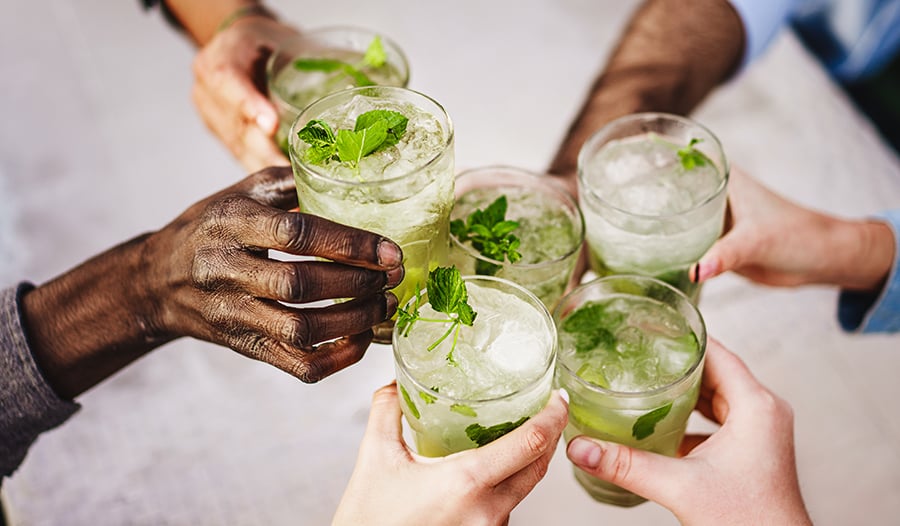The Pros and Cons of Alcohol

Dry January is an appealing concept to many folks: CivicScience,[1] a consumer analytics platform, reports that right before January 2023, 41% of adults surveyed said they would try abstinence. However, follow-up found only 16% of folks actually made it through the month without having any alcohol[2].
Is it healthy to abstain—for a month or completely? Or is it to your benefit—both socially and in terms of your health—to have a moderate amount of alcohol? Let’s look at the pros and cons.
On the pro side, there is the sense of social connection that comes from toasting a friend’s birthday or celebrating a major achievement with a glass of bubbly. And there is some indication that moderate or occasional imbibing may be heart-healthy. According to Harvard’s T.H. Chan School of Public Health[3], “moderate drinking seems good for the heart and circulatory system. Heavy drinking is a major cause of preventable death in most countries.” Mayo Clinic adds[4]: “Moderate alcohol use has possible health benefits, but it's not risk-free.” Notice how they hedge their bets with “might be” and “possible.”
Negative Effects of Alcohol
So, what are the risks? According to the World Health Organization (WHO)[5], not only are there no studies that show that moderate drinking reduces the risk of type 2 diabetes and heart disease, but the cancer risk associated with drinking any amount of alcohol is significant. The World Health Organization states that “alcohol causes at least seven types of cancer, including … bowel cancer and female breast cancer. And the more alcohol you drink, the greater your risk of developing cancer.” However, data indicates that “half of all alcohol-attributable cancers in the WHO European Region are caused by “light” and “moderate” alcohol consumption.” Why does alcohol increase your cancer risk? While being metabolized, alcohol is converted to a toxic intermediary called acetaldehyde, which is a known carcinogen even in small amounts.
Cancer is not the only alcohol-related health risk—not by a long shot. According to the Centers for Disease Control and Prevention[6], excessive alcohol use led to more than 140,000 deaths and 3.6 million years of potential life lost each year in America from 2015 to 2019, shortening the lives of those who died by an average of 26 years.
The short-term risks[7] of drinking include injuries from crashes and falls and alcohol poisoning. Long-term risks include high blood pressure, stroke, liver disease, and digestive problems; weakening of the immune system; cognition problems and dementia; depression and anxiety; alcohol use/abuse disorder; and relationship problems at home, with friends, and at work.
Things to Consider
If you are generally healthy (no heart disease, cancer, autoimmune disorders, or emotional distress) and continue to drink alcohol, remember to:
- Occasionally swap alcohol for a non-alcoholic beverage—but make sure it isn’t loaded with added sugars.
- Practice mindful drinking[8]: Set a goal for how many drinks you will have (with max of two on any day and avoid drinking daily), drink seltzer or water in between alcoholic drinks. Eat food while you are drinking.
- Stick with organic wines, free of pesticides, and avoid sugar-heavy rums, whiskies, and bourbons.
- Stop drinking at least an hour before heading to bed[9] so your body has a chance to metabolize the alcohol before you try to sleep. According to the Sleep Foundation, when alcohol is in your system, it can worsen sleep apnea, disrupt REM sleep and cause you to wake up and not be able to go back to sleep.[10]
- Make sure your nutrition—through food and supplements—supports a healthy liver, a happy gut, and a strong immune system. That includes foods high in B vitamins[11], such as salmon, leafy greens, and legumes[12] and vitamins C (citrus fruits) and E[13] (in almonds, beet greens, and peanuts), plus supplements of liver-loving milk thistle[14], alpha lipoic acid[15] and NAC[16]—aka N-acetyl cysteine. Tip: Although those last two are found in broccoli, spinach, brussels sprouts, turkey, chicken, and fish, respectively, it’s tough to get enough from food alone. Also, consider a daily probiotic to help counter alcohol’s negative effect on your microbiome.[17]
References:
- https://www.today.com/health/dry-january-what-it-what-are-benefits-women-t146331
- https://www.today.com/health/dry-january-what-it-what-are-benefits-women-t146331
- https://www.hsph.harvard.edu/nutritionsource/healthy-drinks/drinks-to-consume-in-moderation/alcohol-full-story/
- https://www.mayoclinic.org/healthy-lifestyle/nutrition-and-healthy-eating/in-depth/alcohol/art-20044551
- https://www.who.int/europe/news/item/04-01-2023-no-level-of-alcohol-consumption-is-safe-for-our-health#:~:text=The%20risks%20and%20harms%20associated,that%20does%20not%20affect%20health
- https://www.cdc.gov/alcohol/fact-sheets/alcohol-use.htm
- https://www.cdc.gov/alcohol/fact-sheets/alcohol-use.htm
- https://www.nyc.gov/site/doh/health/health-topics/alcohol-and-drug-use-alcohol-and-health.page
- https://www.alcoholrehabguide.org/alcohol/how-long-alcohol-stay-system/#:~:text=It%20takes%20time%20for%20alcohol,drug%20test%20is%20being%20used.
- https://www.sleepfoundation.org/nutrition/alcohol-and-sleep
- https://pubmed.ncbi.nlm.nih.gov/17131909/
- https:/www/.healthline.com/nutrition/vitamin-b-foods#TOC_TITLE_HDR_9
- https://www.ncbi.nlm.nih.gov/pmc/articles/PMC6064813/
- https://www.ncbi.nlm.nih.gov/books/NBK541075/
- https://www.ncbi.nlm.nih.gov/pmc/articles/PMC3929137/
- https://www.sciencedirect.com/science/article/abs/pii/S2213434423000154
- https://www.ncbi.nlm.nih.gov/pmc/articles/PMC8303153/
FELELŐSSÉGKIZÁRÓ NYILATKOZAT:A jelen blognak nem célja diagnózis felállítása...
































 Tartalomjegyzék
Tartalomjegyzék


